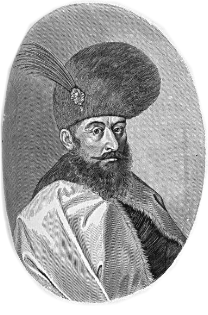This is an old revision of this page, as edited by 82.208.184.13 (talk) at 12:43, 1 March 2005 (→See also). The present address (URL) is a permanent link to this revision, which may differ significantly from the current revision.
Revision as of 12:43, 1 March 2005 by 82.208.184.13 (talk) (→See also)(diff) ← Previous revision | Latest revision (diff) | Newer revision → (diff)Michael the Brave (Mihai Viteazul) (1558 - August 9 1601), Prince of Wallachia (1593-1601), of Transylvania (1599-1600), and of Moldavia (1600), one of the greatest Romania's national heroes, who united for the first time the three Romanian principalities under his rule.

In 1588 he became a ban of Mehedinţi, then at the end of the 1588 stolnic (commissioner) at the court of Mihnea Turcitul, and in 1593 Ban of Craiova during the time Walachia was ruled by Alexandru cel Rău (Alexander the Evil). In September 1593 with the help of the Ottomans, he became voivod of Wallachia, starting his effective rule on October 11.
But it wouldn't take long to fight back against the Turks, the next year he adhered to the "Holy League", a Christian alliance against the Turks, and signed treaties with Sigismund Bathory from Transylvania and Aron Vodă in Moldavia. He started a campaign against the Turks in the autumn of 1594, setting the border on the Danube and conquering several citadels near the Danube, like Giurgiu, Brăila, Hârşova and Silistra.
In 1595, at Alba Iulia, Michael the Brave signed a treaty with Sigismund Bathory, Wallachia becoming a dependency of Transylvania, which will send help to fight the Turks.
On August 13, 1595, at Călugăreni, near the river of Neajlov, Michael the Brave defeated a Turkish army led by Sinan Pasha, then he continued by liberating Târgovişte, Bucharest and Brăila.
The fight against the Turks continued in 1596, when Michael the Brave made several incursions south of the Danube: at Vidin, Plevna, Nicopole, Turnu and Babadag.
On October 18, 1599, he obtained an important victory at Selimbar against the cardinal Andrei Bathory. Michael the Brave entered stately Alba Iulia with an impressive pomp, receiving the keys of the fortress from the bishop Napragy.
Next year, on May 8, the Romanian army under the command of Michael the Brave, defeated the armies of Ieremia Movilă and the Polish ones in Bacău, the Romanian nation was for the first time unified under one ruler, but this union did not last, since in 1601 Michael the Brave was killed in Câmpia Turzii on the order of Habsburgic army leader Giorgio Basta.
"...se zice ca Romanul (Mihai Viteazul - n.n.) este foarte tare si ca planurile lui cresc potrivit cu izbanzile"
Henric al IV-lea, rege al Frantei (1593-1616)
"... un barbat vestit si ales prin nastere, cat si prin statura lui mandra. De asemenea era vrednic de lauda cea mai mare prin virtutile cele mai alese, prin marea sa evlavie catre Dumnezeu, prin iubirea de tara, prin bunavointa fata de cei deopotriva cu el, in sfarsit fata de toti, prin dreptate, adevar, statornicie, marinimie si deprinderea altor virtuti de acest fel. Pe langa acestea, era drag tuturor celor buni pentru darurile inalte ale sufletului lui nobil cu adevarat, pornit chiar prin fire sa savarseasca ispravi grele, ca si prin cuvantul sau, care, de cate ori era nevoie si chiar fara pregatire dinainte, ii iesea din gura bland si intelept." Baltazar Walter Silezianul, "Scurta si adevarata descriere a faptelor savarsite de Io Mihai, Domnul Tarii Romanesti", aparuta la Gorlitz, 1599
"Este un lucru demn de cea mai mare consideratie si de glorie eterna, intrucat ceea ce nu au putut realiza atat de multi imparati, regi si principi a izbutit un Mihai, cel mai neinsemnat si mai sarac dintre duci, anume sa invinga ostile marelui Sultan." Edward Barton, agent englez la Istanbul, 7 noiembrie 1595
"Nu pot sa nu va comunic ca din zi in zi creste teama atat in pieptul cat si in sufletul fiecaruia din cauza marii valori pe care o demonstreaza in aceste parti ale Europei acest nou Alexandru (cel Mare), caruia ii spune Mihai Voievodu." Misionarul franciscan la Constantinopol Eustachio Fantena, 17 octombrie 1958
The prince of Wallachia, Mihai Viteazul (1593-1601) regained the country's independence and unified all the Romanians in the first centralized Romanian state, including Wallachia, Transylvania and Moldavia (1600-1601). The short-lived was undone by the intervention of the Ottoman Empire, the kingdom of Poland, and the Habsburg
Empire, worried to have a powerful Romanian state. The accomplishment of Mihai Viteazul was made possible by the unity of kin and language of all the Romanians, by awakening national consciousness and its assertion throughout the entire Romanian space. His deed served as an example. The voivodes of the three Romanian Lands, ruling after Mihai Viteazul, tried to follow suit, and recreate the ancient kingdom of Dacia.
See also
| Preceded by: Alexandru cel Rău |
Prince of Wallachia 1593-1601 |
Followed by: Radu Mihnea |